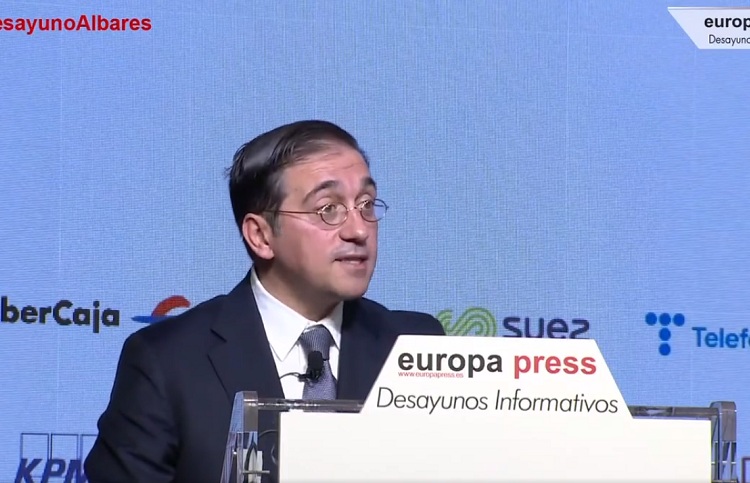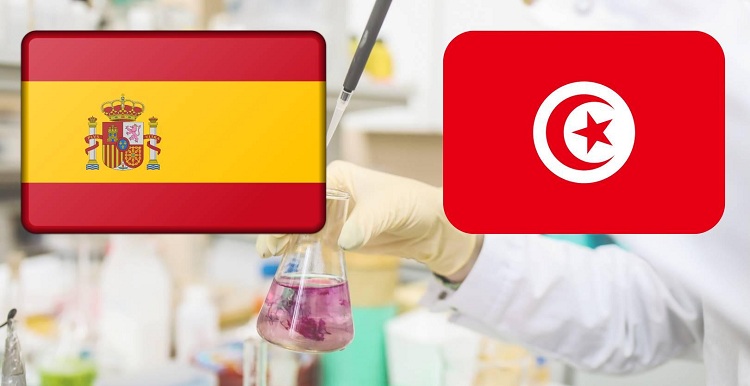Eduardo González
The Minister of Foreign Affairs, José Manuel Albares, assured yesterday that Spain will be “with its partners and allies” in the Ukraine crisis, both in the path of dialogue and deterrence, and warned, in response to criticism from Unidas Podemos, that “the foreign policy of the Government is set by the president.”
“In these moments of so much tension in the world due to the COVID and the critical situation in Ukraine, Spain does not hide and the Government acts as the Spanish people want”, as “a country that is committed to dialogue and democracy”, said Albares during his speech at a breakfast briefing organized by the Europa Press agency in Madrid.
Yesterday’s event coincided with the meeting in Geneva between the US Secretary of State, Antony Blinken, and the Russian Minister of Foreign Affairs, Serguei Lavrov, to try to lower the tension on the border between Russia and Ukraine. Moscow has demanded in writing that NATO curb its eastward expansion and U.S. President Joe Biden warned Thursday that if the Russians “intervene” in Ukraine “they will pay for it.” At the end of the meeting, both declared that the talks had been “useful and substantial”. Blinken assured that his country is in favor of “the path of diplomacy” but reiterated that if “Russia continues with aggression against Ukraine”, there will be “a united, swift and severe response”, while Lavrov stated that “Russia has never, anywhere, threatened the Ukrainian people”.
In this regard, Albares said that the international community is “holding its breath” in the face of the crisis between Ukraine and Russia, but reiterated his commitment to dialogue to curb the tension, because “we cannot go back to the times when conflicts were solved with armed force”. However, “dialogue is not negotiation,” the minister warned in reference to Moscow’s “unacceptable” requests. “No one can dictate to the EU or NATO who its members can be, nor will we compromise on the sovereignty and territorial integrity of states,” he added.
Regarding the EU, which next Monday holds a Foreign Affairs Council specially dedicated to the Ukrainian crisis, Albares was “sure” that “unity is what will prevail, unity in dialogue, but also unity in deterrence if necessary; but we are not in that scenario, that should also be clear.” “Let’s give dialogue a chance, but if it does not bear fruit, Spain will stand with its EU and NATO partners in deterrence; but let’s not anticipate scenarios,” he added.
Response to Podemos
Spain has decided to intensify its military involvement in the Ukraine crisis by possibly sending several Air Force fighters to Bulgaria to participate in NATO’s air deterrent deployment in Eastern Europe and with the incorporation of two Navy ships to the Alliance’s permanent fleet in the Black Sea, among them the frigate Blas de Lezo, which had planned to join the NATO operation in the coming weeks but is going to bring forward its departure to next week in view of the direction the crisis is taking, as the Minister of Defense, Margarita Robles, informed the press on Thursday.
Spain’s involvement in the conflict has been harshly criticized by the Government’s main partner, Unidas Podemos. The most outspoken in his criticism was the spokesman in the Congressional Foreign Affairs Committee, Gerardo Pisarello, who pointed out that “after the fiasco in Afghanistan, following the United States in this warmongering bravado is reckless and irresponsible”. The Secretary of International Affairs of Podemos, Idoia Villanueva, described as a “grave error” the encouragement of “the warmongering escalation in Ukraine to defend the interests of the United States” and the former Secretary General of Podemos and former Vice President of the Government, Pablo Iglesias, declared that “the pro-USA furor ended with Aznar and today it would be a great clumsiness of the socialist part of the Government to confront all its partners and set up the ‘war party’ with the PP”.
In response to these criticisms, Albares limited himself to recalling yesterday that “Spain’s foreign projection is set by the President of the Government”, Pedro Sánchez, who sets it out “every Tuesday through the Council of Ministers”. “I feel very comfortable with the guidelines of the President of the Government,” he concluded.






